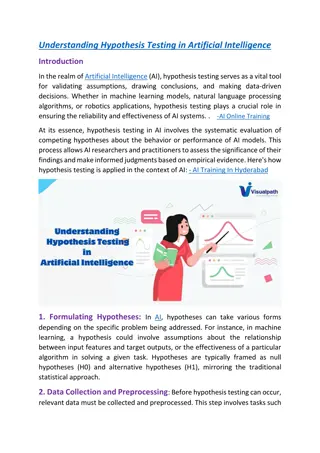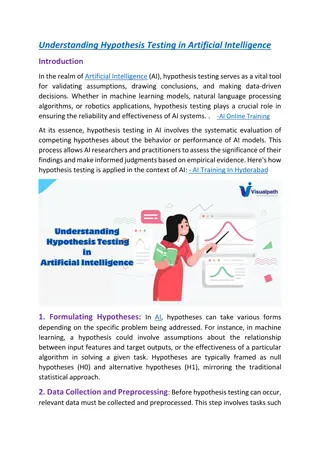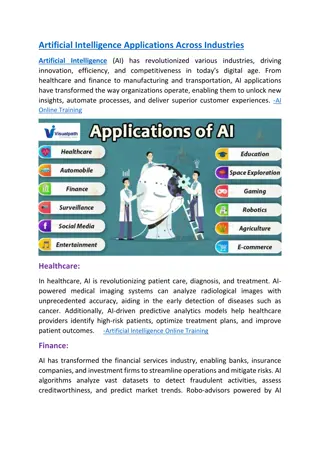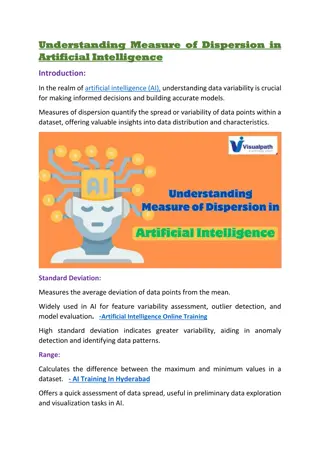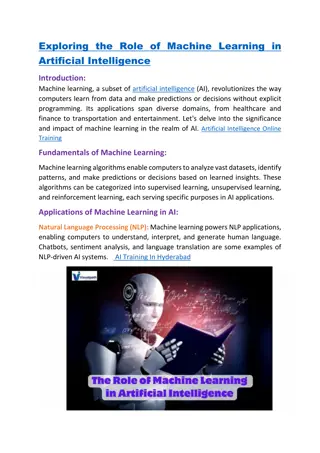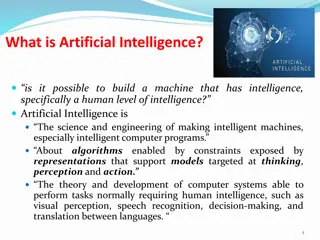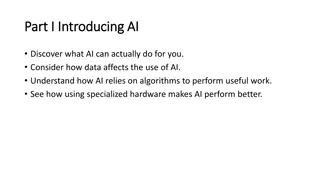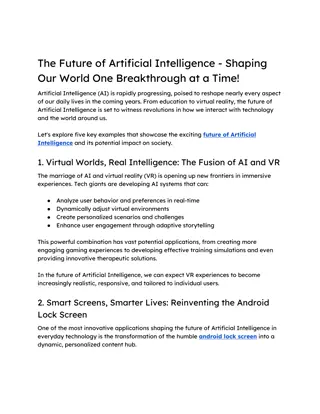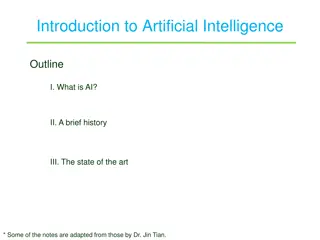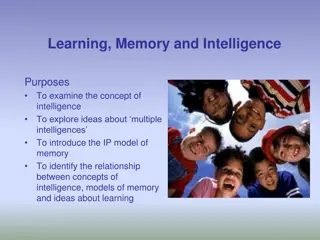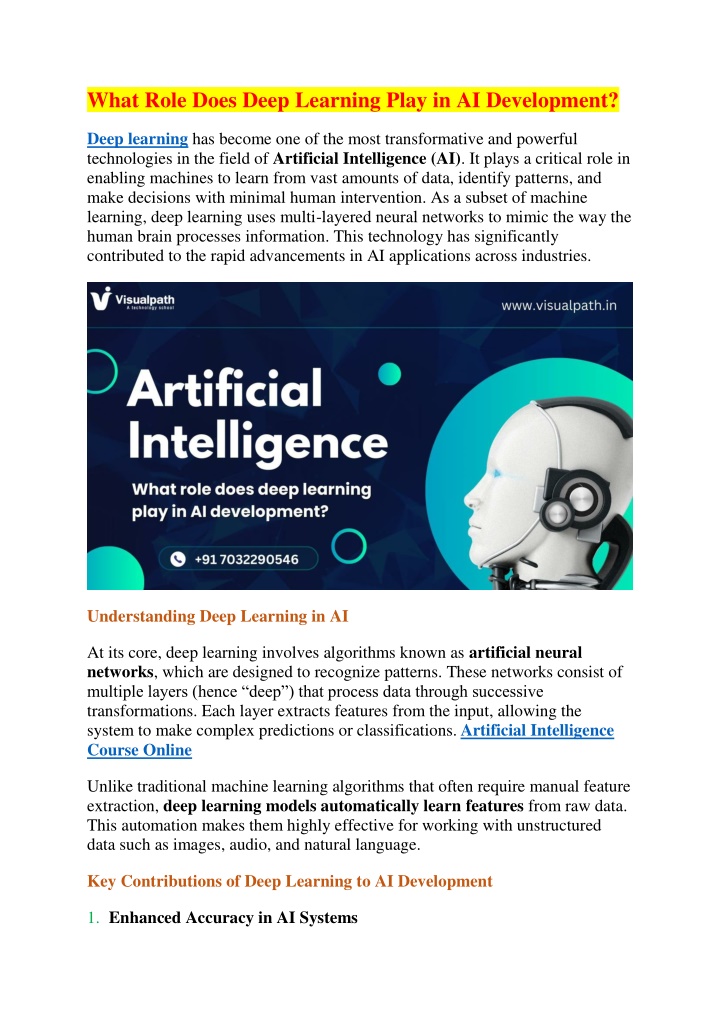
Machine Learning Course | Artificial Intelligence Online
Join VisualPath for a top-rated Machine Learning Course in Hyderabad and gain real-time project experience with guidance from industry experts. Our Artificial Intelligence Online Training ensures hands-on learning, flexible schedules, and recorded se
Download Presentation

Please find below an Image/Link to download the presentation.
The content on the website is provided AS IS for your information and personal use only. It may not be sold, licensed, or shared on other websites without obtaining consent from the author. If you encounter any issues during the download, it is possible that the publisher has removed the file from their server.
You are allowed to download the files provided on this website for personal or commercial use, subject to the condition that they are used lawfully. All files are the property of their respective owners.
The content on the website is provided AS IS for your information and personal use only. It may not be sold, licensed, or shared on other websites without obtaining consent from the author.
E N D
Presentation Transcript
What Role Does Deep Learning Play in AI Development? Deep learning has become one of the most transformative and powerful technologies in the field of Artificial Intelligence (AI). It plays a critical role in enabling machines to learn from vast amounts of data, identify patterns, and make decisions with minimal human intervention. As a subset of machine learning, deep learning uses multi-layered neural networks to mimic the way the human brain processes information. This technology has significantly contributed to the rapid advancements in AI applications across industries. Understanding Deep Learning in AI At its core, deep learning involves algorithms known as artificial neural networks, which are designed to recognize patterns. These networks consist of multiple layers (hence deep ) that process data through successive transformations. Each layer extracts features from the input, allowing the system to make complex predictions or classifications.Artificial Intelligence Course Online Unlike traditional machine learning algorithms that often require manual feature extraction, deep learning models automatically learn features from raw data. This automation makes them highly effective for working with unstructured data such as images, audio, and natural language. Key Contributions of Deep Learning to AI Development 1.Enhanced Accuracy in AI Systems
Deep learning has pushed the boundaries of accuracy in AI. Whether its speech recognition, object detection, or machine translation, deep learning models often outperform traditional methods. For instance, virtual assistants like Siri and Alexa use deep learning to interpret voice commands with high precision. Artificial Intelligence Training Institute 2.Breakthroughs in Computer Vision Deep learning is the foundation of computer vision applications, enabling machines to see and understand images and videos. Convolutional Neural Networks (CNNs) allow AI to detect objects, recognize faces, and analyze visual content. These capabilities are widely used in self-driving cars, medical imaging, surveillance, and more. 3.Natural Language Processing (NLP) One of the most significant advancements in AI has come through deep learning in NLP. Models like BERT, GPT, and other transformers are based on deep learning architectures. They have revolutionized language understanding, powering chatbots, language translation services, sentiment analysis, and content generation tools. 4.Scalability and Learning from Big Data Deep learning thrives on big data. Its performance improves with more data and computational power, making it ideal for enterprise-level AI applications. As businesses generate more data, deep learning becomes essential for extracting actionable insights and driving decision-making.Artificial Intelligence Online Course 5.Automation and Real-time Decision Making Deep learning enables AI systems to perform real-time decision-making without explicit programming. In industries like finance, healthcare, and manufacturing, AI systems powered by deep learning can detect fraud, diagnose diseases, and optimize operations with minimal human involvement. Challenges and Future Potential While deep learning offers immense advantages, it also comes with challenges. It requires large datasets, high computational resources, and can sometimes act as a black box, making it difficult to interpret the decision-making process. However, ongoing research in areas like explainable AI (XAI) and
efficient neural networks continues to address these issues.Artificial Intelligence Training Looking ahead, deep learning will remain a cornerstone of AI development. With advancements in hardware (like GPUs and TPUs), improved algorithms, and better data availability, deep learning models will become more efficient, transparent, and accessible. Conclusion Deep learning plays a pivotal role in shaping the future of Artificial Intelligence development. Its ability to learn from data, adapt to new challenges, and power intelligent systems has transformed industries and everyday life. As technology evolves, deep learning will continue to drive innovation, pushing the boundaries of what AI can achieve. Trending Courses: Informatica Cloud IICS/IDMC (CAI, CDI),Azure AI Engineer, Azure Data Engineering, Visualpath stands out as the best online software training institute in Hyderabad. For More Information abouttheArtificial Intelligence Online Training Contact Call/WhatsApp: +91-7032290546 Visit: https://www.visualpath.in/artificial-intelligence-training.html



